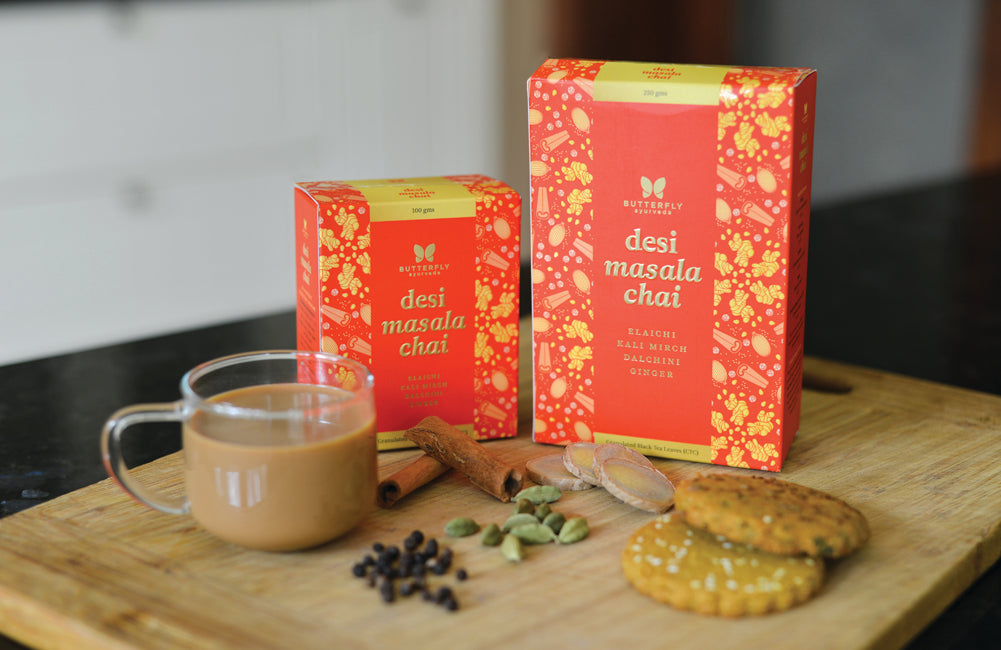
We Indians can’t dream of beginning our days without a ‘slurp’ of tea. And, after all these centuries of chai, we get to hear “stop drinking tea with milk, it’s bad for health”!
Drinking milk tea is bad for health is a big myth. Here’s why :
Myth#1 : Drinking milk tea causes acidity.
Preparing tea with milk has been practiced in India for hundreds of years. In many villages and country sides, tea is often prepared using milk, alone. In this modern era of technology, we experience the exquisite delicacy of tea in a variety of ways, prepared differently across multitude of cultures and national boundaries.
1. Milk tea causes acidity only when the tea leaves have been overboiled. Over boiled milk and tea leaves tend to harm your esophagus, and internal stomach lining, whilst also making the tea excessively bitter in taste.
2. Milk tea will cause acidity if a freshly brewed cup of tea is not consumed within 10 minutes of its preparation. Drinking stale tea or cold tea causes indigestion, and could lead to acidity.
3. Moreover, reheating an already prepared cup of tea is even more harmful, and can cause acidity when consumed. This happens due to the increase in the amount of tannins that are expelled while reheating the tea. In such cases one may suffer from nausea or stomach cramps after consuming it.
4. One major cause of acidity due to consumption of milk tea can be attributed to the use of poor or low quality of tea leaves. These have excess tannins component in them, and instantly cause cramps in the stomach when consumed. Good quality tea freshly sourced from the garden is processed in the most natural way to maintain its taste and aroma, and retains the good tannins that are found to be rich in antioxidants, and also carry anti - cancerous and anti inflammatory properties.
Myth#2 :There is too much sugar in the milk tea, and hence it is bad for health
Adding sugar to milk tea is a personal choice. So, if one wants to avoid it then one could. However, having numerous cups of tea without sugar during the day could lead to acidity. Here is why:
1. Sugar is pitta shamak (balancing), therefore, it helps in reducing the heat in the stomach, liver and consequently, also in the body. It helps reduce inflammation and could help balance the ‘Jatharagni’- digestive fire. If the tea is consumed over and again without sugar, pitta may get aggravated and could lead to acidity. However, the reverse is also possible, excess consumption of sugary milk tea also leads to an imbalance in doshas. Therefore, sugar in moderation when consuming 3- 4 cups a day is okay, if you are not diabetic.
We recommend a little bit of sugar to be added in your tea especially when you consume masala chai. This will help pacify the pitta, that could aggravate due to the presence of ginger or any other warming herb or spice. In case you are a diabetic, you may add a natural sweetener in your tea.
2. Secondly, sugar when consumed in water and milk directly enters into the bloodstream upon consumption. The benefits of the tea or any herbal tea taken with sugar instantly reach all parts of the body at once, which is not the case when the sugar is not added to the tea.
Myth#3: Milk tea is not good for digestion.
Freshly prepared milk tea with added herbs helps promote digestion, boosts appetite and also improves immunity. It boosts the Jatharagni - ‘the Digestive Fire’. Having 2 -3 cups of tea a day could help you relieve stress, and rejuvenate the mind and body.
Drinking excess tea, such as 4 to 5 cups or more of tea regularly could affect liver health. Certain studies also show that it could also lower iron absorption within the body due to the presence of tannins. Tannins are chemical compounds found in tea plants that carry numerous health benefits, however, also some families of tannins adversely affect the health.
Things To Consider Before You Pick Your Next Cup:
1. Check for the freshness of tea, and the garden where it has been sourced from, also how it is processed after being plucked. It is important that you choose good quality tea leaves for your daily consumption.
2. What is the nature of the blend of your tea ? Nowadays, a lot of brands have come out with artificially flavoured teas, claiming it as herbal teas Desi masala chai, masalas to add to chais, which may not be suitable for regular consumption, and could affect the digestive system and metabolic processes. Look out for tea blends that carry no artificial flavours, extracts, colours and preservatives. Further, it is important to note that not all blends are developed keeping in mind the compatibility quotients amongst ingredients, and may cause raucous in the stomach and aggravate dosha imbalance, when consumed repeatedly over a period of time. Choose blends that are backed with research, and are built on a strong ayurvedic understanding of the ingredients, their use and effect on the body when consumed together.
Bottom line:
Overall, tea is an excellent choice of beverage, since it carries polyphenols that help improve or treat digestion issues, helps with weight management, diabetes, neurodegenerative disease, and cardiovascular disease. It has multiple other benefits depending from blend to blend.
Enjoy Butterfly Ayurveda’s huge range of wellness herbal teas. These include our herbal infusions such as Love your body, Mama Love, Tummy Love and Heart Strong. These carry no tea leaves, hence have no caffeine or tannins component. Some of the milk teas blends made with care are : Desi Masala Chai - CTC black tea leaves procured from tea estates in Assam blended with Kali Mirch, Ginger, Cardamom & Cinnamon, and Masala Chai, black tea leaves with herbs like Banaphsha, Cloves and Cinnamon for the extra warm snug during the winter.

Comments (0)
Back to News